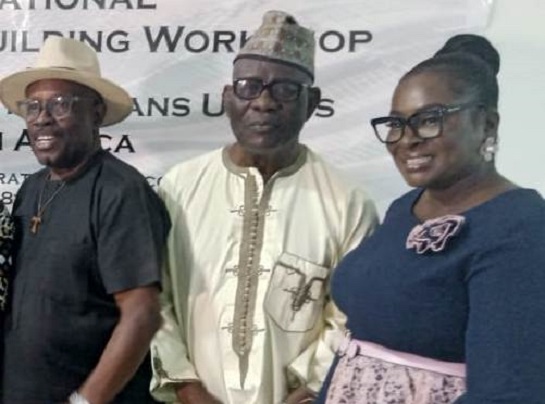Alhaji Sidiku Buari (middle) in a pose with Bessa Simons and Abena Ruthy
Alhaji Sidiku Buari, a former president of the Musicians Union of Ghana (MUSIGA), has urged stakeholders in the music industry as well as Ghanaians to protect highlife as a genre that represents the country’s character.
He advised music stakeholders to create special platforms to celebrate legendary highlife artistes and preserve the Ghanaian highlife music.
“Every country has its own music, so why do we have to leave highlife and chase other genres which do not promote our culture. It is quite sad that we are supporting the promotion of other genres, which is a total deviation,” he said.
He claims that highlife music is a beautiful genre that, when pushed, will earn international recognition to support the music business in the country.
The former president of MUSIGA from 1999 to 2007, stated in an interview with BEATWAVES at the Erata Hotel in Accra that one of the reasons highlife’s appeal is dwindling is the lack of a concerted effort by Ghanaian music industry leaders to promote the genre.
“I think this is the time we have to work as a team to bring back highlife music and inspire the next generation of musicians to perform more highlife,” he stressed.
According to him, highlife music could be used as a developmental tool to transform the mindset of people due to its good lyrics, even though he thinks highlife music is uniquely Ghanaian and better captures the spirit of the country than other genres.
Alhaji Sidiku, who is also former Vice President of the International Federation of Musicians (FIM), said it was important for the youth and up-and-coming artistes to follow the good steps of veteran musicians to project highlife globally.
The veteran filmmaker, musician, sportsman and businessman has won over 62 awards in sports, music and film.
He has over 16 films which include ‘Jealousy’, ‘Meba’, ‘Who Is To Blame’, ‘Man Woman’, among others to his credit.
A former national athlete, he won silver and gold medals during the All African Games held in Senegal and West African Games, all in 1963.
In 1965, he won bronze medal in the 4×400 metres relay in All African Games held in Congo Brazzaville.
By George Clifford Owusu


